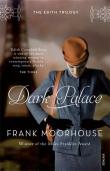 2831828567889956776.jpg
2831828567889956776.jpg
 2831828567889956776.jpg
2831828567889956776.jpg
'Winner of the Miles Franklin Literary Award.
'Five years have passed since Edith Campbell Berry's triumphant arrival at the League of Nations in Geneva, determined to right the wrongs of the world. The idealism of those early Grand Days has been eroded by a sense foreboding as the world moves ever closer to another war. Edith's life too, has changed: her marriage and her work are no longer the anchors in her life – she is restless, unsure, feeling the weight of history upon her and her world.
'As her certainties crumble, Edith is once again joined by Ambrose Westwood, her old friend and lover. Their reunion is joyful, and her old anxiety about their unconventional relationship is replaced by a feeling that all things are possible – at least in her private life.
'But World War II advances inexorably, and Edith, Ambrose and their fellow officers must come to terms with the knowledge that their best efforts – and those of the well-meaning world – are simply useless against the forces of the time. Moving, wise and utterly engrossing, this is a profound and enriching novel. Grand Days and Dark Palace confirm Frank Moorhouse as one of our greatest writers – a master of tone and timing, an elegant and exuberant stylist, and an unerring chronicler of the human spirit.'
[sourced from publisher's website]
(Publication abstract)
 Martini : A Memoir
Milsons Point
:
Knopf
,
2005
Z1222009
2005
single work
prose
Martini : A Memoir
Milsons Point
:
Knopf
,
2005
Z1222009
2005
single work
prose
Moorhouse 'muses on the aesthetics of martini lore ... and the nature of drinking.' He also 'reflects on the role of the martini in his own life in prose as dry and intoxicating as the martini itself.'
Source: Random House website, http://www.randomhouse.com.au/WEB_ASP/ttle_detail.asp?isbn=1740513126
Sighted: 31/10/2005
 Martini : A Memoir
Milsons Point
:
Knopf
,
2005
Z1222009
2005
single work
prose
Martini : A Memoir
Milsons Point
:
Knopf
,
2005
Z1222009
2005
single work
prose
Moorhouse 'muses on the aesthetics of martini lore ... and the nature of drinking.' He also 'reflects on the role of the martini in his own life in prose as dry and intoxicating as the martini itself.'
Source: Random House website, http://www.randomhouse.com.au/WEB_ASP/ttle_detail.asp?isbn=1740513126
Sighted: 31/10/2005